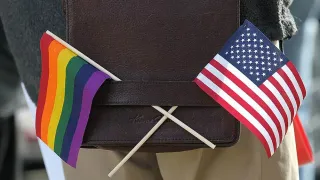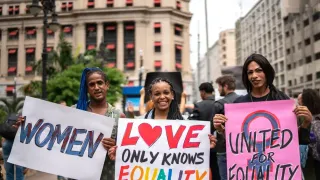
8 hours ago
Federal Court Victory: William Saki Secures Right to ‘GAY’ License Plate in Landmark Ohio Case
READ TIME: 3 MIN.
William Saki, an openly gay resident of Ohio, applied for a personalized license plate with the word “GAY” through the Ohio Bureau of Motor Vehicles (BMV). His application was timed to coincide with National Coming Out Day, intending to celebrate and publicly affirm his queer identity. However, the BMV rejected his request, labeling the plate “inappropriate/invalid.” Saki’s subsequent attempts to secure plates with alternative affirming words such as “QUEER” and “HOMO” were also denied, raising concerns about the bureau’s criteria for approving personalized plates .
The denials stood in contrast to the BMV’s allowance of certain messages, as Saki discovered it would be possible to emblazon plates with messages like “NO GAYS,” “NO HOMOS,” and “STR8." This discrepancy prompted Saki and his legal counsel to question whether the bureau’s screening process was not only inconsistent but discriminatory against LGBTQ+ applicants .
Represented by First Amendment attorney Brian D. Bardwell, Saki filed a joint lawsuit alongside Cyrus Mahdavi, an Ohioan whose request for a “MUSLIM” plate was similarly rejected. This case, registered as Saki et al. v. Norman et al. (Case No. 1:25-cv-01893) in the U.S. District Court for the Northern District of Ohio, challenged the BMV’s arbitrary filtering of “forbidden words” and argued that the rejections violated both free speech and equal protection under the law .
The plaintiffs demonstrated that the BMV’s guidelines were inconsistently applied, allowing some religious or identity-based plates (“ATHEIST,” “BAPTIST,” “SIKH,” “HINDU”) while automatically rejecting others (“JEW,” “MUSLIM,” “LESBIAN”). Bardwell argued that the state’s actions amounted to viewpoint discrimination, directly infringing on Saki’s First Amendment rights. “Mr. Saki – like everyone else in this country – has a First Amendment right to free speech. He’s out, he’s proud, and Governor DeWine can’t shove him back in the closet just because he’s made a political career out of harassing gay people,” Bardwell stated before the hearing .
On September 10, 2025, Judge Dan Aaron Polster presided over the case in Cleveland. During proceedings, representatives of the BMV conceded that the bureau had erred in its rejection of the vanity plates. Judge Polster dismissed the case after ordering the BMV to rectify its process, specifically requiring the agency to unlock any of the 62,000 “forbidden words” in its database that do not meet the standard of being “offensive, disparaging or socially insensitive.” Additionally, the BMV must now provide clear instructions for applicants who believe their plates were improperly rejected, ensuring transparency and accountability .
Bardwell praised the ruling, saying, “Judge Polster saw right through the BMV’s attempts to silence drivers it doesn’t agree with and ordered them to get back in line with the First Amendment. We’re incredibly grateful that he was able to reach a quick decision reaffirming Mr. Saki’s inalienable right to tell the truth about who he is, even when the governor doesn’t approve. We’re excited to see the BMV pull its act together, and we’ll be watching to make sure it doesn’t stray from the judge’s orders” .
Saki expressed his joy and relief following the decision: “We got lucky with a judge who cut straight to the real question: Are gay Ohioans free to come out and live our lives without the government forcing us back into the closet? Thankfully, our judge knew the right answer and ordered the BMV to let me say who I am,” he told The Buckeye Flame. Saki added humorously, “I can’t wait for my ‘GAY’ license plate to come, but it’s going to be hard waiting for my boyfriend to mount it on my rear end and screw it all the way in” .
This victory has resonated across Ohio’s queer community, who see the decision as more than a win for personalized plates—it’s a powerful affirmation of their right to publicly embrace and display their identities. The BMV’s updated policy promises a more inclusive process, removing arbitrary barriers that have historically silenced marginalized voices.
Legal experts and queer advocates have hailed the ruling as a significant step toward dismantling systemic biases in state institutions. By setting a clear precedent that state agencies cannot discriminate based on viewpoint or identity, the case strengthens protections for queer individuals and other minority groups seeking equal treatment under the law .






